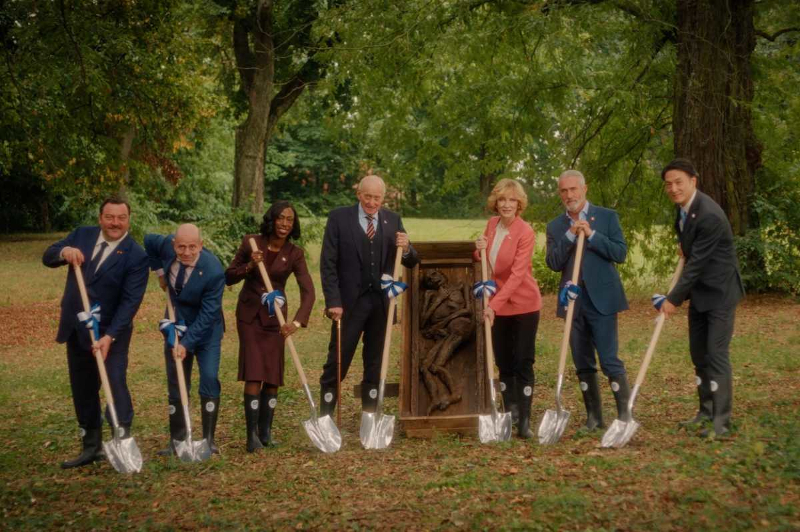Director – Guy Maddin, Evan Johnson, Galen Johnson – 2024 – Germany, Canada – Cert. 15 – 109m
****1/2
The G7 leaders meet at a summit only to find themselves trapped in the woods following an apocalyptic event – out in UK cinemas on Friday, December 6th
Every so often, the leaders of the world’s leading liberal democracies – the G7 – gather for summits to deal with the impending global crisis. On this occasion, it’s a bright, sunshiny day. Prior to getting down to business, they are toured through some local woods and shown the remains of one of the Bog People in a deep pit, their corpses perfectly preserved, apart from their bones which have disappeared, thanks to the properties of the bog land environment in which they were buried thousands of years ago. One corpse which they are shown has had his penis cut off and hung ornamentally round his neck. British PM Cardosa Dewindt (Nicky Amuka-Bird) is understandably somewhat taken aback by this.
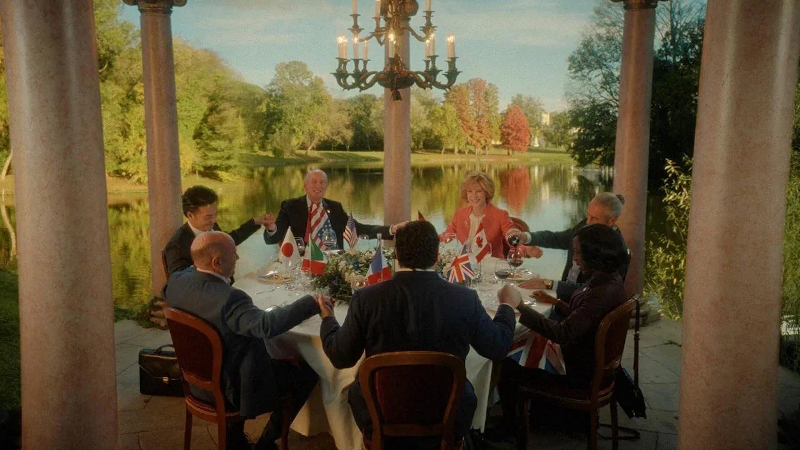
The seven have their picture taken by the side of the pit, posing with spades. Then it’s on to the gazebo in a large clearing to sit down and discuss the matter in hand. After some verbal pleasantries, their host, the German Chancellor Hilda Orlmann (Cate Blanchett), gets the ball rolling. And they split into groups of two and three to see if they can separately come up with a draft statement of some sort. Hilda puts herself, Cardosa and the Canadian PM Maxime Laplace (Roy Dupuis) into one group, US President Edison Wolcott (Charles Dance) and Italian PM Antonio Lamorle (Rolando Ravello) into a second, and French Premier Sylvain Broulez (Denis Ménochet) and Japanese PM Tatsuro Iwasaki (Takehiro Hira) into a third.

The French helps the Japanese with his English – the diplomatic language of choice, in which the latter is not terribly well versed. The US is probably the oldest statesman there, has seen it all before, and more or less dictates to the Italian, who willing scribbles everything down, not always making sense of it in the process. The British, German and Canadian group is somewhat derailed by the glasses-of-wine-downing Canadian’s needing to take some time away from the table to get himself together. It transpires that he has recently been through a divorce, and is still coming to terms with what has transpired. It further emerges that not only is he sexually smitten with the disinterested British PM, while the German Chancellor has taken a fancy to him, and indeed goes to “console” him in the woods later on.
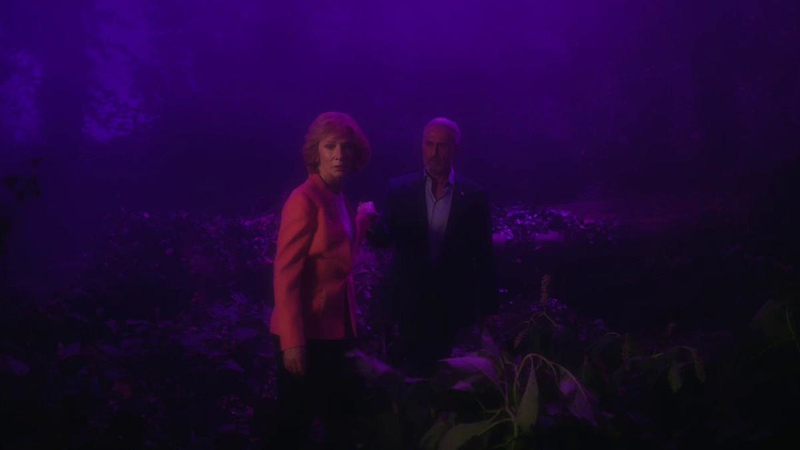
They come up with three separate statements which resemble waffle – the US-Italian one is basically the US putting something together which will be what is required but doesn’t actually say very much, the German-British-Canadian one uses a relationship reconciliation manual as a metaphor, and the numerous pieces of paper comprising the French-Japanese one are unfortunately caught up in a gust of wind, requiring the French to leave the table and go into the wider clearing to gather them all up.
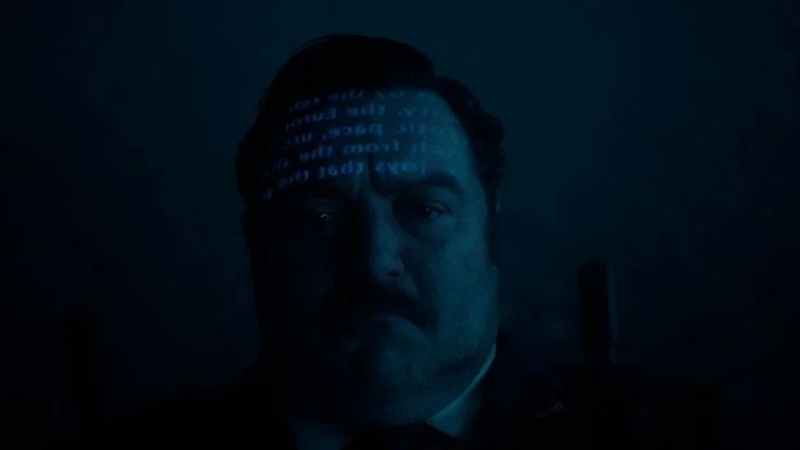
As the skies darken, the weather turns foggy, and the light changes to a vaguely greenish hue, there is no sign of any catering staff bringing food or drink to the table. Hilda is concerned that, although they already knew there was a crisis – why else would they be here? – a crisis has occurred and taken everyone by surprise. The Frenchman ends up in the woods and falls into the pit containing the bog man’s remains. When he later returns to the gazebo table, he is covered in mud. In a trance-like frenzy of verbal creativity, he starts composing a lengthy statement. The assembly decides that they ought to move into the mansion on the estate. The US tires easily because of his advanced age, and keeps falling asleep. Both need to be ferried, and the others manage to find two wheelbarrows for this purpose.
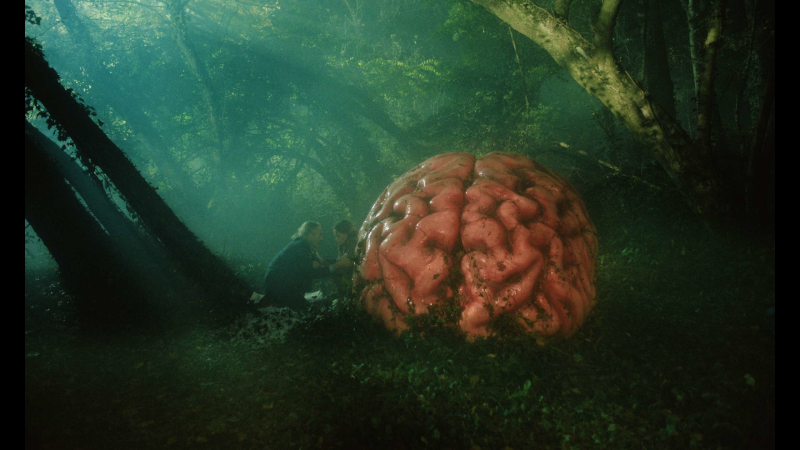
There is a small ferry for the purpose of crossing the lake, but it’s not been left at their jetty, so someone will have to go into the water, follow the rope and bring it over. There are other matters demanding their attention – the discovery of a giant, Volkswagen-sized brain in the forest, and the appearance of the EU President Celestine Sproul (Alicia Vikander) who appears to be talking gibberish – until Hilda points out it is, in fact, Swedish – and the apparent resurrection of the environmentally preserved bog people.
In their earlier discussions, the leaders have linked the bog people to both protestors and terrorists, drawing little distinction between the two groups, and the bog people now appear as mindless, statuesque figures who might be advancing or might be standing still, looking like they could have wandered in from a zombie movie. One of the men receives a text from a seven-year-old girl trapped at the mansion asking for help: Hilda reasons that this might be a bot designed to entrap paedophiles, and that playing along is probably their best chance of being rescued…
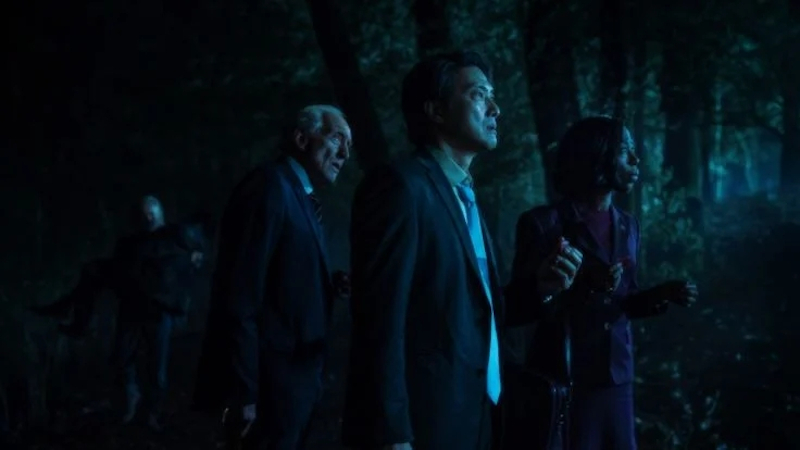
The piece starts off as a dialogue-heavy drama, with emphasis on using and crafting words, which is, after all, the stock-in-trade of statesmen. But then, as the weather worsens, presaging some terrible catastrophe, it turns into a bizarre form of fantasy, not horror exactly, not science fiction – although the giant brain in the woods suggests both – but something closer to satire, with writer-director Evan Johnson and his two co-writer-directors grappling with the problem of, what exactly has gone wrong with leadership in our Western democratic world?
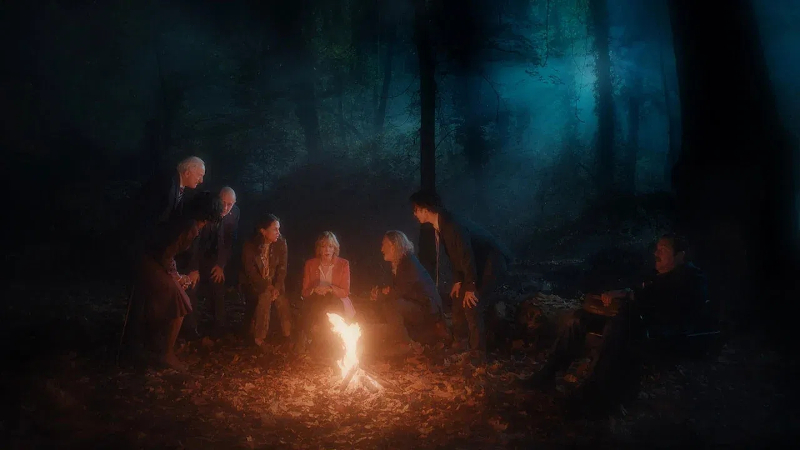
Certainly, you get the impression that these leaders don’t so much lead as fulfil the roles pre-ordained for them by the political system under which they operate, which in the process prevents them actually doing anything of value to solve or even affect the vast problems confronting the countries they represent. The cast pull out all the stops as the characters’ plight becomes increasingly distant from the everyday reality with which they are familiar and which they take for granted until, suddenly, it’s no longer there. This is underscored by the overall shift of tone: The otherworldly strangeness of the later scenes is light years away from the sunlight normality of the first third or so, an opening which serves to slowly pull you in to its potentially apocalyptic, never fully explained scenario.
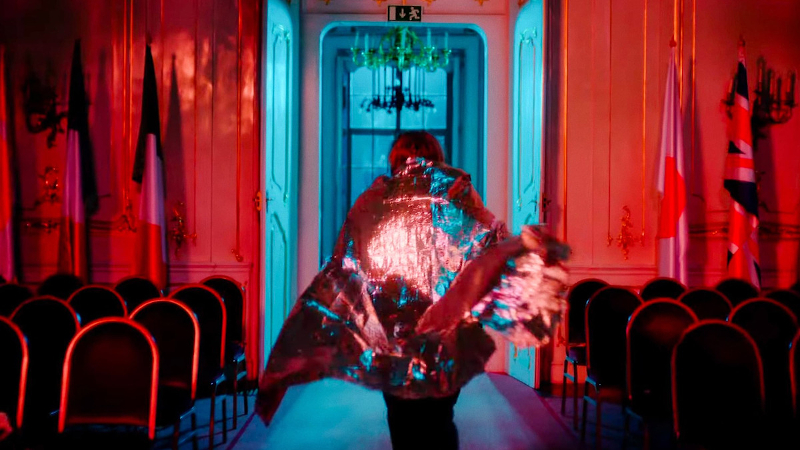
Like the very different Civil War (Alex Garland, 2024) this refuses to paint its various factions in political colours – they are simply the elected leaders of their particular countries. So, for instance, the British PM is a woman (there was no potential female candidate in the recent UK election) and, odder still, the US President is a Brit. You accept all this much as in all those films where the American President appears and is recognisably the President, but not any specific, historical President. It plays out as happening at the present time, completely convincingly, and yet the leaders portrayed are fictions, brought to life by the writer, the co-directors and the actors. In them, however, we perhaps see something of our own leaders and their sometimes powerlessness to achieve anything worthwhile because of the system in which they operate.
It’s not a particularly difficult film to watch – in fact, if you can get on its wavelength, it’s absolutely hilarious – but it’s packed full of conundrums likely to make you think about what you’ve seen for days (if not weeks, months, and years afterwards. As such, it’s a film one should seek out, watch, and engage with.
Whether the film is a timely warning or a pronouncement made too late because events have already moved too far forward, time alone will tell.
Rumours is out in cinemas in the UK on Friday, December
6th.
Read my shorter, alternative review of the film for Reform magazine.
Trailer:
